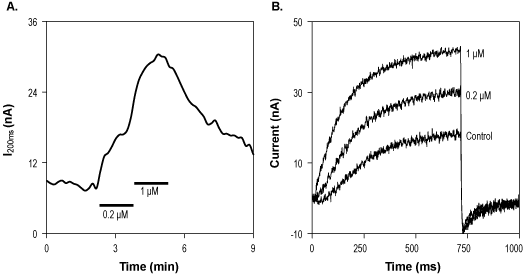Overview
- Boehlen, A. et al. (2013) Br. J. Pharmacol. 168, 1182.
 Alomone Labs ICA-110381 enhances KCNQ2/KCNQ3 heteromeric channels expressed in Xenopus oocytes.A. Time course of KCNQ2/KCNQ3 current enhancement by 0.2 and 1 µM ICA-110381 (#I-160). Currents were elicited by application of voltage step from a holding potential of -100 mV to +60 mV (700 msec). B. Superimposed example traces of current responses before and during perfusion of 0.2 and 1 µM ICA-110381, as indicated.
Alomone Labs ICA-110381 enhances KCNQ2/KCNQ3 heteromeric channels expressed in Xenopus oocytes.A. Time course of KCNQ2/KCNQ3 current enhancement by 0.2 and 1 µM ICA-110381 (#I-160). Currents were elicited by application of voltage step from a holding potential of -100 mV to +60 mV (700 msec). B. Superimposed example traces of current responses before and during perfusion of 0.2 and 1 µM ICA-110381, as indicated.
- Schwake, M. et al. (2006) J. Neurosci. 26, 3757.
- Howard, R.J. et al. (2007) Neuron. 53, 663.
- Boehlen, A. et al. (2012) Br. J. Pharmacol. 168, 1182.
KV7 or KCNQs are voltage-gated K+ channels. These channels are mainly responsible for the cardiac and auditory IK currents and the neuronal M-current but can be found in other tissues as well. Voltage-gated K+ channels are tetramers of α-subunits, which surround a K+-selective pore1. The different five KCNQ subtypes have distinct assembly preferences encoded by a C-terminal cytoplasmic assembly domain, the A-domain tail. This domain is a self-assembling, parallel, four-stranded coiled coil2.
ICA-110381 is a synthetic opener of KCNQ channels with an effective concentration of 0.1μM-10μM. In hippocampal CA1 cells, ICA-110381 reduces cell membrane excitability caused by hyperpolarization and decreases membrane resistance. It exhibits strong anticonvulsant properties by acting mainly on the KCNQ2 subunit of the KV7 channel and reduces seizure severity and frequency3.
ICA-110381 (#I-160) is a highly pure, synthetic, and biologically active compound.

